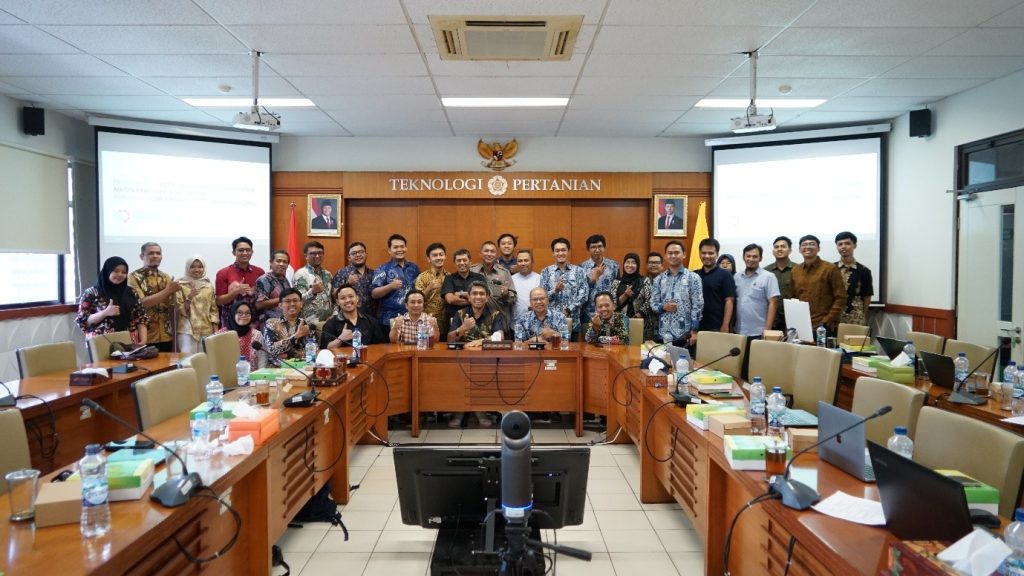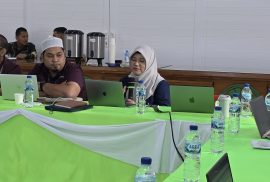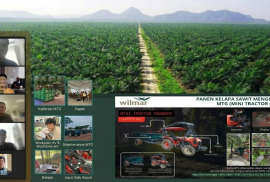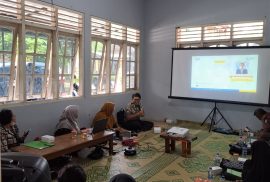
Yogyakarta, October 16, 2025 —The Department of Agricultural and Biosystems Engineering (DTPB), Faculty of Agricultural Technology, Universitas Gadjah Mada (FTP UGM), held a Coordination Meeting on the Preparation of the Agricultural Machinery (Alsintan) Road Map in collaboration with the Ministry of Industry of the Republic of Indonesia, local government agencies, and representatives from the agricultural machinery industry. The meeting took place at the Operational Room of FTP UGM.
The event was attended by Mr. Antonius Fernando from the Ministry of Industry, as well as representatives from the Agriculture and Food Security Office of the Special Region of Yogyakarta (DIY), the Industry and Trade Office of DIY, and the Indonesian Association of Agricultural Machinery Companies (ALSINTANI).
Representatives from leading agricultural machinery industries were also present, including PT Agrindo, PT Yanmar Diesel Indonesia, PT Pura Barutama, PT Kubota Indonesia, CV Karya Hidup Sentosa (QUICK Tractor), PT Karya Solusi Angkasa, CV Rumah Mesin, PT Stechoq Robotika Indonesia, and PT Yogya Presisi Teknikatama Industri (YPTI).
From UGM, the meeting was attended by the expert team of DTPB FTP UGM led by Prof. Dr. Ir. Lilik Sutiarso, M.Eng., IPU., ASEAN Eng., APEC Eng., along with lecturers and researchers specializing in agricultural mechanization and biosystems technology, including Ir. Andri Prima Nugroho, S.T.P., M.Sc., Ph.D., IPU., ASEAN Eng., APEC Eng. (Head of the Laboratory of Energy and Agricultural Machinery), Dr. Ir. Radi, S.T.P., M.Eng., IPU, ASEAN Eng., APEC Eng., Sri Markumningsih, S.T.P., M.Sc., Ph.D., and Ardan Wiratmoko, S.T.P., M.Sc.
The team was supported by enumerators and technical staff, namely Anggit Wijanarko, S.T.P., Saifuddin Afif, S.T.P., M.Sc., Diena Ita’ul Mufida, S.T.P., and Ririn Febri Kusuma Wardani, S.T.P.
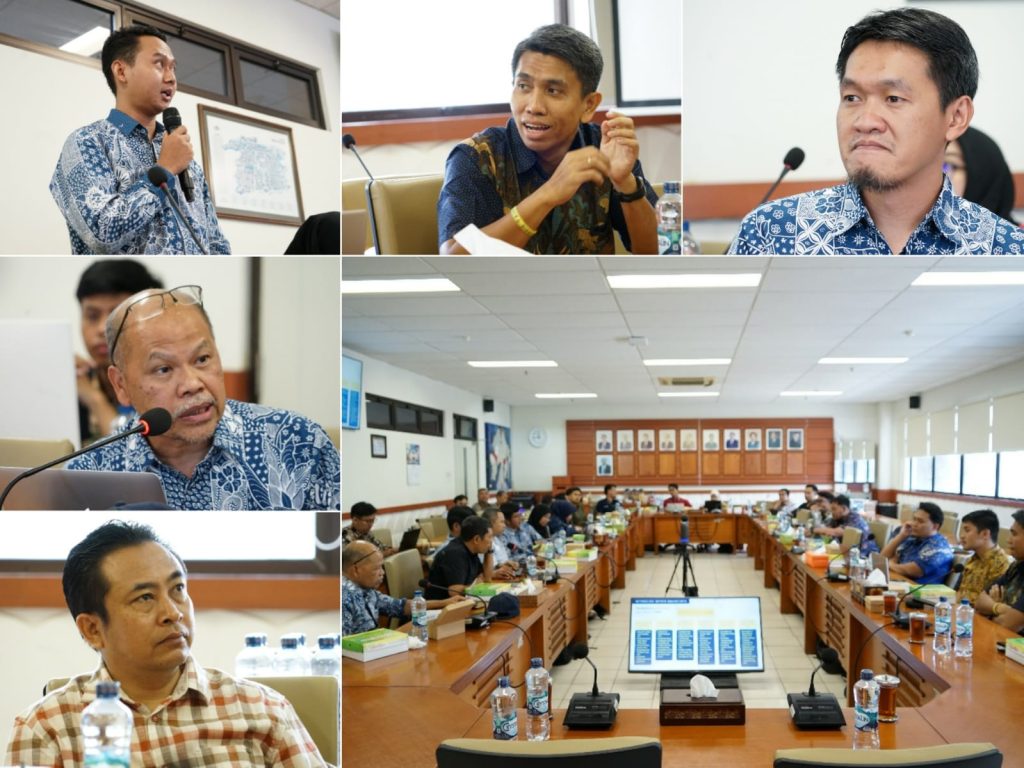
During the presentation and discussion session, Prof. Lilik Sutiarso emphasized the importance of formulating an adaptive, efficient, and environmentally friendly agricultural mechanization roadmap to support the modernization of national agriculture.
“We need to move toward Mechanization 4.0, which is location- and resource-based. It’s not only about adopting technologies like drones, but also about how innovations can be adapted to land conditions, farmers’ capacities, and local ecosystems,” Prof. Lilik explained.
He added that improving the agricultural mechanization index must go hand-in-hand with strengthening human resource capacity at the farmer level, as well as fostering synergy between academia, government, and industry to develop agricultural machinery based on real field needs.
Mr. Antonius Fernando, representing the Ministry of Industry, stated that the development of the Alsintan Road Map is part of the implementation of the National Industrial Development Master Plan (RIPIN).
“We want to ensure that strengthening the domestic industrial structure remains a key component of this roadmap. The agricultural sector supply chain must continue to involve domestic industries, not depend on imports,” he said.
The Ministry of Industry also highlighted the importance of establishing material hubs, developing precision agricultural machinery technologies such as GPS-equipped four-wheel tractors, and deepening the national industrial structure in alignment with the Ministry of Agriculture’s policies and the national industrial downstreaming agenda.
Industry representatives shared their insights regarding challenges and opportunities for strengthening the national Alsintan industry.
Mr. Malik from PT Stechoq Robotika Indonesia emphasized that the industry is ready to support government programs in developing agricultural machinery technology but called for clear research directions and product requirements to ensure that innovations can be effectively implemented in the field.
Meanwhile, Mr. Wawan from CV Karya Hidup Sentosa (KHS) stressed the need for synchronization between equipment procurement policies and domestic production capacity. He highlighted the importance of consistent policies to reduce dependency on imported products and strengthen the competitiveness of local industries.
Mr. Bondan from PT Frog Indonesia added that several technological components, such as drone propellers, still rely on imports and expressed hope for stronger support for domestic product development.
The representative from the Industry and Trade Office of DIY reaffirmed the regional government’s full support for strengthening the agricultural machinery industry. The procurement of agricultural machinery by regional governments is now conducted under stricter regulations, prioritizing local products and high Domestic Component Levels (TKDN) as a strategic measure to support bureaucratic reform and industrial downstreaming in the agricultural sector.
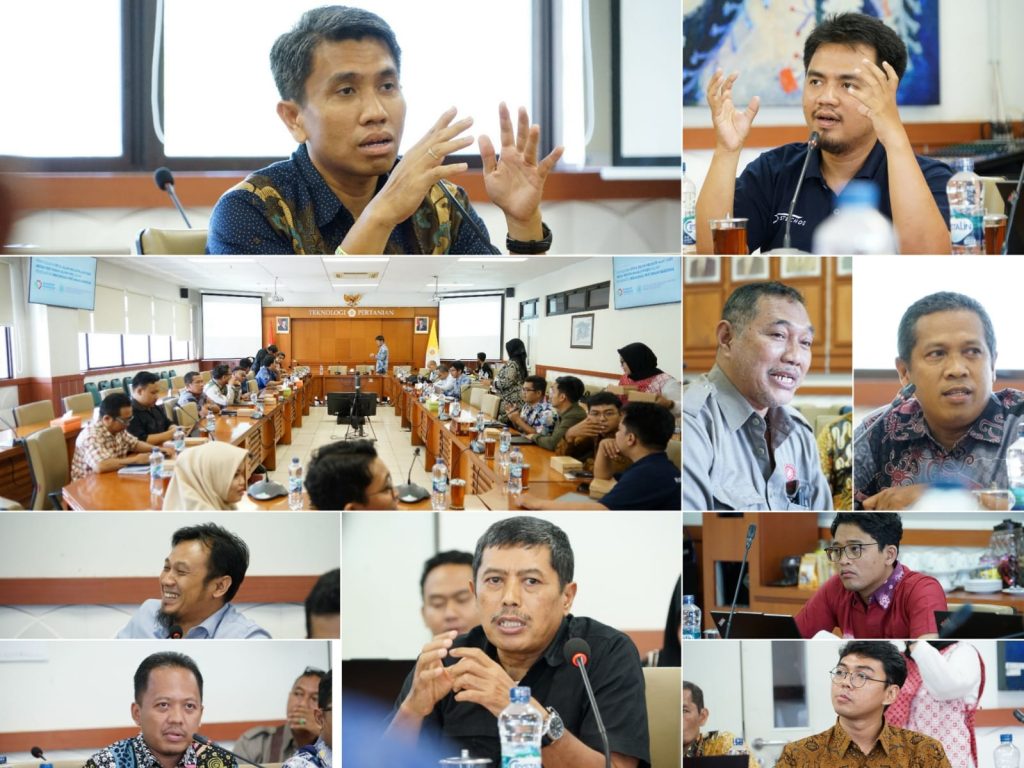
This coordination meeting marked an important step in strengthening collaboration among academia, government, and industry toward achieving sustainable national agricultural mechanization.
The initiative also aligns with DTPB FTP UGM’s commitment to advancing the Sustainable Development Goals (SDGs), particularly:
-
SDG 2 – Zero Hunger, by enhancing agricultural productivity and machinery efficiency;
-
SDG 9 – Industry, Innovation, and Infrastructure, by strengthening technological innovation and domestic industry development; and
-
SDG 12 – Responsible Consumption and Production, by promoting environmentally friendly and resource-efficient agricultural machinery production.
Through this activity, DTPB FTP UGM reaffirms its role as a center for research and innovation in agricultural mechanization and biosystems, as well as a strategic partner for the government and industry in realizing a modern, resilient, and sustainable agricultural system in Indonesia.
